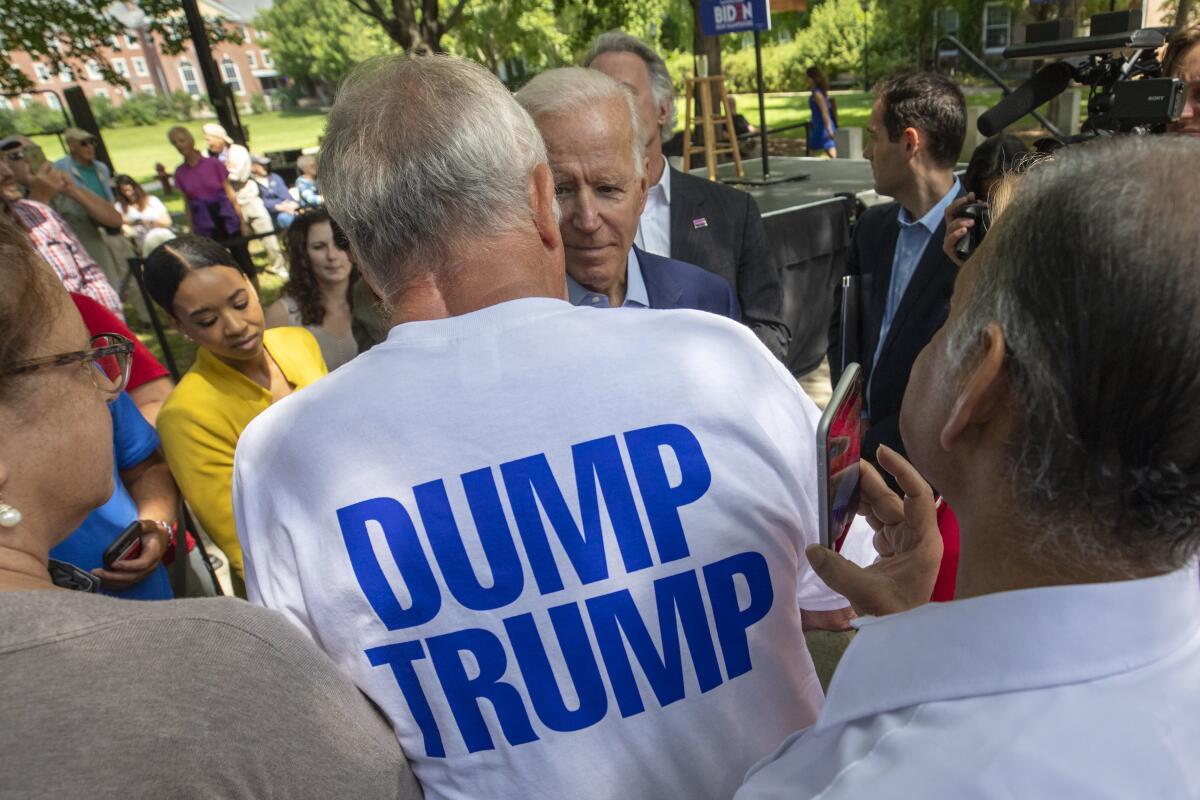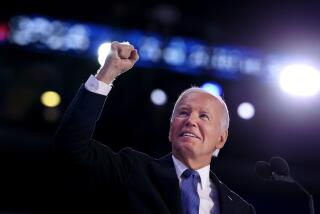The promise and peril of Joe Biden’s front-runner campaign

CROYDON, N.H. — Joe Biden was whipping through his stump speech at a rustic lakeside campground here when he stumbled over the location of where exactly he spoke a few hours earlier at nearby Dartmouth College.
“I want to be clear, I’m not going nuts,” Biden told supporters perched on camp chairs on the shore of Loon Lake as the sun sank behind him, turning the sky sherbet shades of purple and pink. “I’m not sure whether it was the medical school or where the hell I spoke. But it was on the campus.”
It was a minuscule misstatement. But Biden’s irritation — he pointedly looked at the media covering the event as he corrected himself — was clear.
The former vice president is the front-runner in the 2020 Democratic presidential race, yet he is facing real questions about the fragility of that status. Any misstep or gaffe sparks a flurry of news coverage that undermines the premise of his campaign — that he is the candidate best equipped to beat President Trump.
Four months since he launched his bid, Biden is intensifying his campaign’s focus on the electability argument. His first television ad emphasizes polls that show him beating Trump. The candidate stresses the point at campaign events. Even his wife, Jill Biden, pointedly argued to Democrats here that they should vote for Biden even if they liked another candidate better because he had the best chance of winning next year.
The strategy takes a big risk because it hinges not on voters’ passion for Biden but on their perception of his ability to win — a strength that could erode as voters get to know some of his less prominent rivals.
Biden’s aides defend their emphasis. “We are advertising on what people want to hear,” said one Biden ally who asked not to be named to discuss campaign strategy. “We want voters to know we understand that what they care about is beating Trump, not ‘vote for me and hold your nose.’”
But “when you have to tell people you’re electable, you’re probably not as electable as you think you are,” said Andrew Smith, a political science professor at the University of New Hampshire.
Biden has led national polls since entering the race, including in the aftermath of his shaky performance during the first debate, in June. But his once-formidable lead has shrunk, and the question remains about how much of his advantage merely reflects name recognition for a man who has been in the public eye for more than four decades.
Some of Biden’s rivals, especially Sen. Elizabeth Warren (D-Mass.), have been gaining strength and cutting into his polling lead in the early states in the nominating process, attracting bigger crowds and drawing more media attention. A Wall Street Journal/NBC News poll released this month found feelings about Biden were less intense than about his top rivals, Warren and Sen. Bernie Sanders (I-Vt.). Among Democratic primary voters, 56% had positive feelings about Biden — compared with 66% who felt that way about Sanders and 61% about Warren.
Increasingly, polling of hypothetical general election matchups shows that Biden is not the only Democrat who could beat Trump. That complicates the Biden campaign’s emphasis on polls that show him winning. The prospect that others could beat Trump could shift the focus of debate among primary candidates from who can beat the president to what kind of leader the party wants to lead it to victory in 2020.
The Biden campaign is trying to guard against erosion of his standing. They have aggressively responded to reporting on gaffes. His communications director tweeted a photo of the overflow line at a Hanover, N.H., rally to counter the view that he lacked an enthusiastic following. Biden himself has reached for more inspiring rhetoric.
“We can’t just be a campaign about defeating President Trump,” he said in Keene, N.H. “A simple campaign is not enough to beat him. It has to be a movement.”
Still, Biden’s recent swing through this state, which holds the first primary of the campaign season, shows the promise and peril of adhering to a one-note focus on electability.
“Day by day, we’re witnessing a president of the United States who’s becoming more and more unhinged,” Biden said at an appearance in Croydon, pinpointing, as he has since his campaign’s first moment, the danger the country faces from Trump.
“I wish this was just a campaign slogan or something,” he said, “but folks, he calls himself, ‘the chosen one.’”
Over the course of two days, Biden spoke at three events. He was rambling and unfocused during a healthcare discussion in Hanover, soothing and comforting in Croydon, defiant and aggressive in Keene.
At each, some voters said they were drawn to Biden because of his long record of public service, both as President Obama’s vice president as well as his decades in the Senate.
“All the other ones are fabulous people. They’re all very qualified. But I don’t believe that they have the experience. I think Joe can bring us together,” said Kristen Thies, a graphic designer in her 50s. “He’s the only one who can do it.”
Others expressed reservations.
“The answers were a little bit rambling,” said Margaret Rosenau, a 49-year-old teacher who saw Biden speak in Hanover and remained undecided.
Biden made a number of verbal missteps during the campaign swing, including declaring his affection for Vermont while describing a stop in New Hampshire and an odd digression about how the country might have reacted to an assassination of then-Sen. Barack Obama during the 2008 campaign.
Rosenau said she discounted such gaffes.
“I brush that kind of stuff off. I appreciate people who just talk freely,” she said.
“With that comes some gaffes, some mistakes,” she added. “I think because he’s got that reputation, people laser in on that.”
Others said they were impressed by Biden precisely because of low expectations.
Roger Meyers, 68, who worked for General Electric until he retired, said he had been concerned about Biden’s age and what he viewed as a lack of specifics until seeing him speak in Croydon.
“I can live without policy,” Meyers said, “if we can have stability and sanity and reasonableness and not white supremacy.”
Biden’s age — he’s 76 — was repeatedly raised by voters as a concern. He brushed aside the issue when asked about it by reporters. “I say if they’re concerned, don’t vote for me,” Biden said.
Biden’s wife last week made the bluntest case yet in a “hold-your-nose” pitch to voters when she said at a New Hampshire campaign event that, to beat Trump, Democrats should vote for her husband even if they preferred another candidate’s positions.
“You may like another candidate better,” Jill Biden said, “but you have to look at who is going to win.”
That’s a pitch that has a receptive audience among some Democratic activists.
“The existential question for us is whether our nominee is going to be able to defeat Trump,” said Stuart Appelbaum, a member of the DNC executive committee and an official of the United Food & Commercial Workers Union, who is neutral in the race.
“This is a different nominating process than we’ve had in the past, because the threat to our security is so dramatic that we have to save our democracy.”
Robin Wittemann, 57, described herself as torn between Biden and Sanders.
“It’s sensible versus heart. Biden’s sensible. Bernie’s heart,” she said. “It’s a hard choice. But defeating Trump is priority No. 1.”
Mehta reported from New Hampshire and Hook from Washington, D.C. Times staff writer Michael Finnegan contributed to this report from San Francisco.
More to Read
Get the L.A. Times Politics newsletter
Deeply reported insights into legislation, politics and policy from Sacramento, Washington and beyond. In your inbox three times per week.
You may occasionally receive promotional content from the Los Angeles Times.












